The National Register of Historic Places (NRHP) is the United States federal government's official list of districts, sites, buildings, structures and objects deemed worthy of preservation for their historical significance. A property listed in the National Register, or located within a National Register Historic District, may qualify for tax incentives derived from the total value of expenses incurred in preserving the property.

The City of Las Animas is the Statutory City that is the county seat and the only incorporated municipality in Bent County, Colorado, United States. The city population was 2,410 at the 2010 United States Census. Las Animas is located on the Arkansas River, just west of its confluence with the Purgatoire River, in southeast Colorado east of Pueblo, near the historic Bent's Fort.

There are more than 1,500 properties and historic districts in Colorado listed on the National Register of Historic Places. They are distributed over 63 of Colorado's 64 counties; only Broomfield County has none.

This is a list of properties and districts in Illinois that are on the National Register of Historic Places. There are over 1,900 in total. Of these, 85 are National Historic Landmarks. There are listings in all of the state's 102 counties.
These historic properties and districts in the state of Texas are listed in the National Register of Historic Places. Properties and/or districts are listed in most of Texas's 254 counties.

This is a list of the National Register of Historic Places listings in Warren County, Ohio.
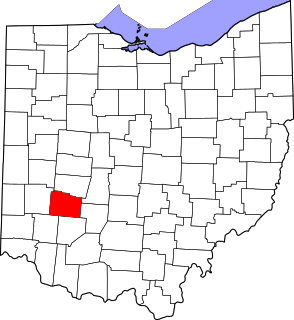
This is a list of the National Register of Historic Places listings in Greene County, Ohio.

This is a list of the National Register of Historic Places listings in Pickaway County, Ohio.

This is a list of the National Register of Historic Places listings in Gunnison County, Colorado.

This is a list of the National Register of Historic Places listings in Las Animas County, Colorado.

This is a list of the National Register of Historic Places listings in Warren County, Virginia.

This is a list of the National Register of Historic Places listings in Scott County, Virginia.
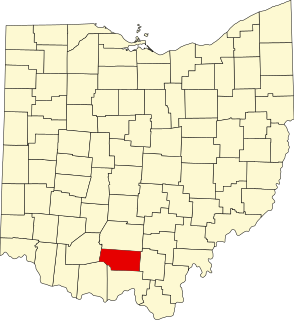
This is a list of the National Register of Historic Places listings in Pike County, Ohio.
This is a list of the National Register of Historic Places listings in Everglades National Park.
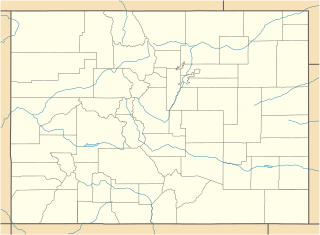
The Trinchera Cave Archeological District (5LA9555) is an archaeological site in Las Animas County, Colorado with artifacts primarily dating from 1000 BC to AD 1749, although there were some Archaic period artifacts found. The site was added to the National Register of Historic Places in 2001 and is located on State Trust Lands.

Colorado Millennial Site is a prehistoric Paleo-Indian archaeological site located near Ruxton in the southeastern part of the U.S. state of Colorado, sitting along the border between Baca and Las Animas counties. It is also known by its site ID, 5LA1115, and the names Hackberry Springs and Bloody Springs.
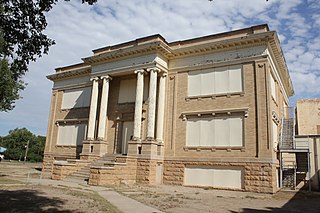
The Bent County High School, in Bent County, Colorado at 1214 Ambassador Thompson Blvd in Las Animas, is a historic school that was built in 1913 or 1914. It has been deemed notable for association with former U.S. Ambassador Llewellyn Thompson, Ken Curtis, and author James Michener’s wife, Mari (Sabusawa) Michener, all of whom attended the school, as well as for "its imposing, three-story, massive-columned architecture". It was designed by Swedish architect James Larson. The building was listed on the National Register of Historic Places (NRHP) in 2010.
Earl is an unincorporated community in Las Animas County, in the U.S. state of Colorado.

The 7-D School, in Las Animas County, Colorado, near Branson, Colorado, was built during 1936-37 as a Works Progress Administration project. It was listed on the National Register of Historic Places in 2009.
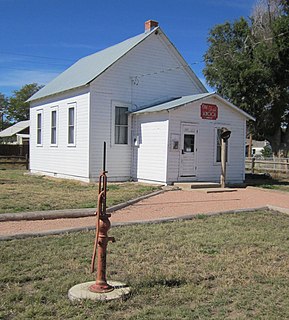
The Old Trail School, at 421 High St. in Wiggins, Colorado, is a historic one-room schoolhouse which was built around 1912. It has also been known as the Reed School, presumably because it was located on the Reed family homestead. It was moved in 1917 to a site close to the Fort Morgan cut-off of the Overland Trail. It served as a school from c.1912 to 1946, when schools were consolidated. It was then moved to Wiggins to stand next to the continuing school there, and it was used as a music room. After the continuing school was expanded in 1963, it was no longer needed for that purpose. The Wiggins Historical Group took ownership in 1964 and moved it to its current location. It was listed on the National Register of Historic Places in 2004.
















